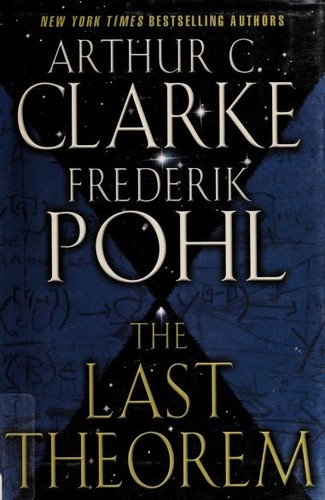Keith Stevenson reviewed The last theorem by Arthur C. Clarke
Review of 'The last theorem' on 'Goodreads'
1 star
From the sublime to the not so. And it really pains me to say that. Arthur C Clarke died last year and it was a great loss indeed. It’s hard to imagine a more famous science fiction author and one who had such a prestigious career. So when ‘the final novel from SF grandmaster Arthur C Clarke’, as the shout line went across the cover of The Last Theorem, came through the letterbox, and I saw that Clarke had co-written it with Frederik Pohl, another significant talent, I though, ‘Wow, this is going to be special.’
The fact is that — pretty much from page one — it wasn’t, and as I read further and my hopes of any improvement were dashed I became saddened and really rather annoyed. I was sad because I no longer saw the spark of brilliance, the unique ideas that characterised Clarke’s work. He was always a bit dodgy on characterisation, but it was the development and explanation of the science at the core of his work that drove you on through his novels. The Last Theorem is a rambling tale where not a great deal in the way of science fiction actually happens, and when it does, it certainly isn’t startling or new.
The story concerns Ranjit Subramanian a young student living in Sri Lanka who takes up mathematics at university and goes on to get married, have kids and solve Fermat’s last theorem which makes him rather famous. Meanwhile some aliens who don’t like Earth developing nuclear weapons, let alone using them, send a destruction fleet to do what destruction fleets do best. The whole story is told in what I think was meant to be a light-hearted jokey way which just comes over as a bit condescending and supercilious. It’s also ‘told’ rather than ‘shown’, despite the age old law of Creative Writing 101, which only serves to do what such an approach always does — distances the reader and robs us of the detail, the immersive experience, to really go with the narrative. There’s also a kind of fifties sensibility running through the book that I really didn’t like. Most women don’t rate a second name and the more ‘developed’ women characters are devoted to their men and know their place. At one point Ranjit’s friend turns up with flowers for his wife and a bottle of whisky for him and Ranjit to drink. I cringed in the background somewhere. As to the science fictional aspects, as you might guess from above, they are lacking in originality. Indeed Clarke basically rips off himself, recycling his skyhook idea from his earlier The Fountains of Paradise and using a mechanism for the aliens to communicate with mankind straight out of 2010: Odyssey Two. This is not a fitting capstone for a lifetime of achievement, and that is what saddens me.
What annoys me is that the publishers went ahead and published it. I am not party to any conversations around how that decision came about. The only reasons that come to mind are they didn’t know or realise that as a piece of writing it sucked or they didn’t care because it was going to sell a boatload anyway or they were asked/ compelled by Clarke’s estate or there was some other legal requirement. I hope there is some other, saner reason.
The other thing that annoys me is that this book is being pushed and pushed hard in the shops. That means that readers who may not have read in the genre before will pick it up as it is purportedly one of the best books by one of our best authors and they will get a totally wrong idea of what we are actually about. Let’s move on to a happier subject.

